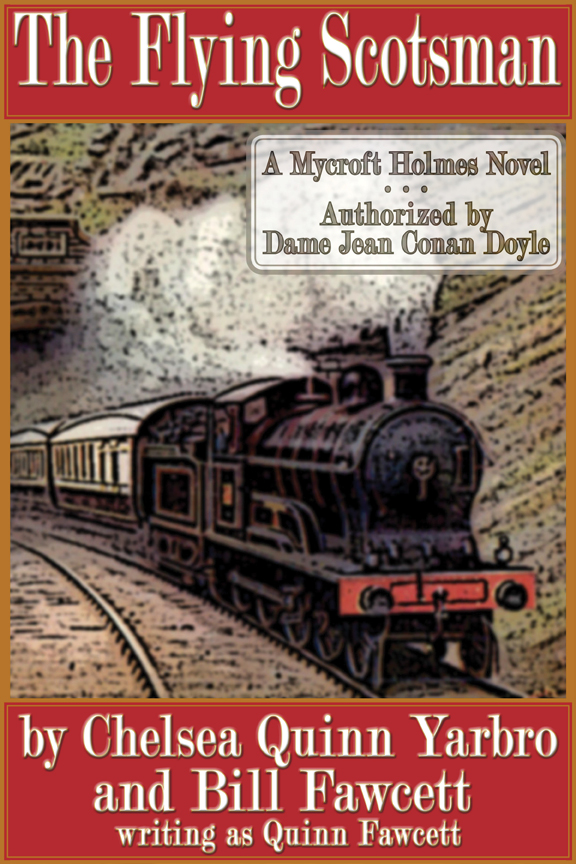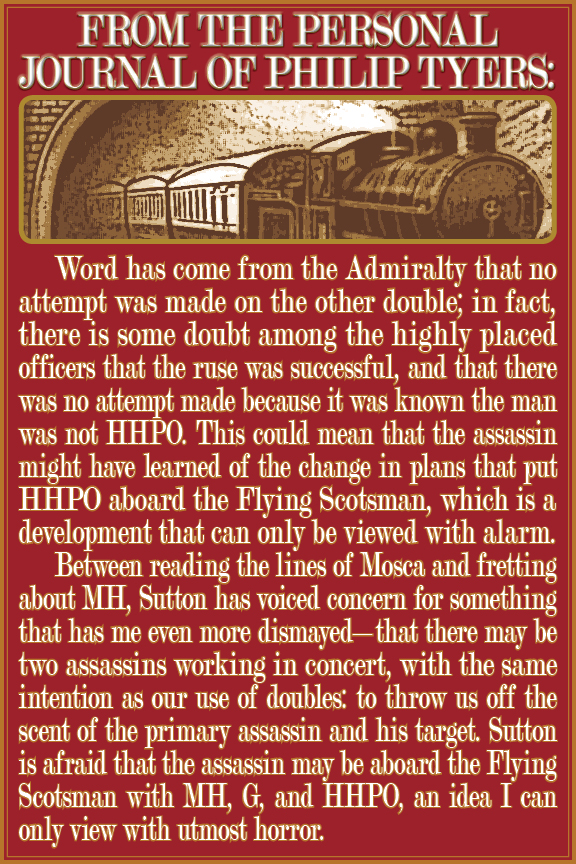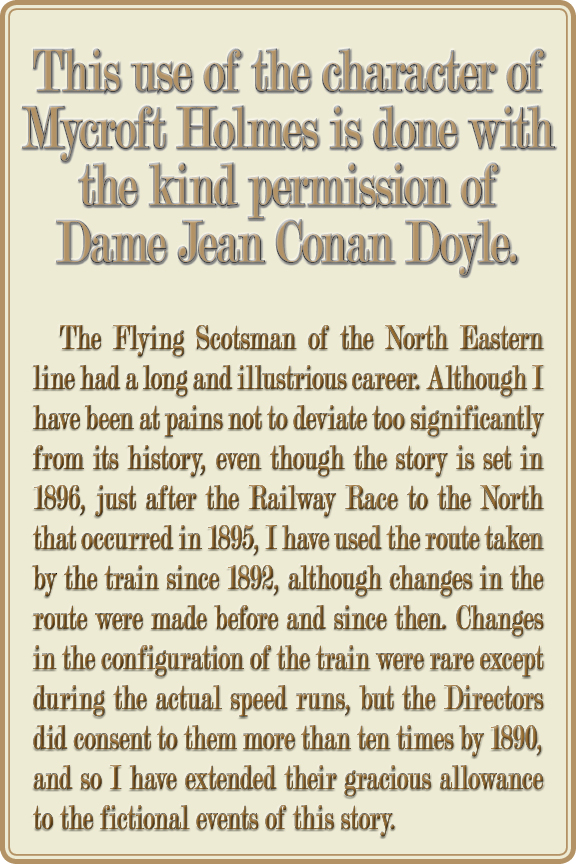The Flying Scotsman
Read The Flying Scotsman Online
Authors: Chelsea Quinn Yarbro,Bill Fawcett
Tags: #Holmes, #Mystery, #plot, #murder, #intrigue, #spy, #assassin, #steam locomotive, #Victorian, #Yarbro






“I WISH
we had
not agreed to attend this infernal wedding,” my employer, Mycroft Holmes, said as the carriage drew up in front of St. Paul’s Cathedral at ten minutes before eleven o’clock on a shining April morning. It was one of those days that poets write about, sweet and lovely, perfect for the wedding we were there to attend. We had come directly from his flat in Pall Mall and planned to go to the embassy of Sweden-and-Norway as soon as the wedding was finished, where we were scheduled to put the finishing touches on an agreement to supply Sweden-and-Norway with help in improving their rail system in exchange for access to Scandinavian ports. It was an important step in assuring that Germany would not control the North Sea, and one toward which Mycroft Holmes had been working for some months. This wedding had provided Prince Oscar a plausible reason to be in England without making his other purpose apparent, as so many of his fellow royals were doing; it was a diplomatic triumph for the Queen, and was recognized as such in every embassy in London.
“You might not feel so beleaguered if the Prime Minister had not insisted that you be responsible for the welfare of the Prince,” I remarked to him as we went toward St. Paul’s in an ever-slower procession of carriages.
“But he did. Like it or not, the whole of this occasion is in my hands. So be it. And frankly, Guthrie, since he has given me the responsibility, I am relieved that he was willing to give me the authority to deal with the situation.” He gave an exasperated sigh. “There is nothing worse than responsibility without authority to enforce it, which was the case until now. What else would I want to have to do?”
This was a less acrimonious remark than some he had made earlier; I realized he was more resigned to these impositions than he claimed. I considered my response, and said, “Does this mean you have received the official authorization you requested?”
“It was delivered shortly before you arrived. I would not be here without it.” Mycroft Holmes had been muttering all the way to the Cathedral, his annoyance becoming muted as we neared our destination; now that we had arrived, his complaints were a low, rumbling growl. “I dislike making these appearances. It draws too much attention to what we are doing. We succeed best working discreetly, without bringing ourselves to public notice. Let the royals glitter and wave; let me do my work in private. A state wedding is far too visible, no matter how useful it may be to our purposes.” He swung around to look at me, his fine morning coat perfectly tailored to his tall, portly form; in the nine years I had worked for him, he had maintained the same physique consistently and, I suspected, would do so far into old age. He sighed as I climbed down behind him. “Oh, Guthrie, what we agree to do in the name of duty.”
“True enough,” I said with a touch of amusement. “To attend a ducal wedding is imposition indeed.” In the years since I entered Mister Holmes’ employ as his confidential secretary, I had come to know many of the secret workings of the diplomatic world in which Mycroft Holmes played so signal a role that I sometimes believed that nothing in the world was as simple as it seemed. It was now obvious to me that most of the apparent swift triumphs of statesmanship were the result of long, delicate maneuvers, some of which I had been part of as a function of my work for Mycroft Holmes; I had traveled through Europe and Asia Minor, Egypt and India, been shot at more than once, had faced assassins and conspirators and the desperate men who inhabit the shadow world of espionage. There were a few events in my past that I could not recall without blushing, and even the suggestion of recalling them made me realize that there were aspects to this work that no gentleman would want to undertake. To be here, in morning dress, for a happy and glorious occasion was a new experience. From my point of view, this wedding was more of a treat than an ordeal.
“It is, it is; but there’s no help for it,” said Holmes, as he motioned me to follow him up the steps into the cathedral. “It is a pity that Sir Cameron should have been one of the Prince’s hosts here in London: he may put two and two together about my presence here.”
“How could he think anything but that you are serving the Queen?” I asked, thinking it was unlikely that Sir Cameron was capable of making such an association, given his bibulous predilections. “In such a gathering, who will notice the likes of us? Knowing Sir Cameron, he will be seeking bigger fish than we are,” I remarked, as we made our way through the illustrious throng. “You are not going to be singled out amid so many foreign luminaries.”
St. Paul’s was filled with the highest-ranking men and women in England, as well as nobles, diplomats, distinguished men of business and their wives and daughters, all rigged out for the wedding of George Albert Oliver, Duke of Marlborough, and Queen Victoria’s great-grand niece, Sophia Augustina of Hannover, the youngest daughter of Otto of Hannover. There had been a week of diplomatic festivities in anticipation of this event, with the Prime Minister taking center stage and leaving the diplomacy to Mycroft Holmes. It had given us a superior opportunity to conduct the kinds of negotiations with the Prince that required circumspection in order to be successful. Most of Prince Oscar’s evenings had been taken up with balls and receptions, occasions that Mycroft Holmes viewed as a necessary irritation. The wedding was the most brilliant occasion in the social calendar, a spring celebration to end the season with a magnificent display of British importance, for it commanded the attendance of half the royal and noble houses of Europe.
“You cannot think that we are the only ones watching.” Mycroft Holmes said as he removed his silk hat and stepped away from the central aisle, moving into the shadows and away from the illustrious swarm of glittering high-born men and women. “In a place like this, there are so many lovely targets for so many groups of rebels, I can only imagine what the men guarding this event must be going through.”
I recalled the problems we had had some time ago with the Japanese embassy, and I could not keep from cringing. “I had not thought of it that way,” I admitted as I looked about trying to determine where the Swedish-and-Norwegian party would be seated along with the other component of the Scandinavian country, Denmark.
“Prince Oscar has been very cooperative, and I could not be more grateful to him for being as forthcoming as he has been, his evenings with Sir Cameron and his cronies aside,” Holmes said as if reminding himself as well as me why our attendance was so crucial. “It is a minor thing to do this to please him, I suppose, and an excellent cover for our greater purpose. I know I should not complain at this request. He has done a great deal for us, after all.” His hooded grey eyes under heavy brows were deceptively lazy; I had discovered in the last two years that this apparent abstraction concealed the most constant activity of his mind.
The Cathedral was more than half full, and the ambassadors of most of the countries of Europe were already in their seats, all adorned with Orders, medals, and honors; the women shone with fine fabrics and jewels, only the hour keeping them from trains and tiaras—in the evening at the ball, at the completion of the reception, their full finery would be displayed.
I saw the Prince of Wales’ state coach draw up at the front of the Cathedral and be immediately flanked by men in dress uniforms of Coldstream Guards. The Prince was greeted with excitement, for it meant the wedding party was not far behind.
“Where is Prince Oscar?” Holmes fretted aloud, watching the entrance to St. Paul’s. “I am not easy in my mind about him coming here.”
“You have told him so,” I reminded him, speaking loudly enough for him to hear.
“And I wish he would be convinced,” said Holmes, looking annoyed.
“Because of Sir Cameron or because of the Prince’s brother?” I asked, for in the last week of private negotiations we had come to understand that his younger brother, Grand Duke Karl, was sympathetic to German ambitions and looked askance at Prince Oscar’s continuing support of Britain.
“Among others. A gathering of this sort is a veritable magnet for malcontents of every stripe, and for worse than malcontents. Self-styled rebels and anarchists must take occasions such as this as the greatest opportunity to make themselves known to the world. Think what a single small bomb would do if it were to go off within a block of this place, with the traffic moving at a crawl. Nothing is going to begin on time, not if this turgid pace continues.” He made an impatient gesture with his silk hat. “If it should turn out that any mishap occurs, Her Majesty’s government will have to endure it at a time when it is essential that we show the extent of our security,” Mycroft Holmes went on, motioning me to his side again as the Prince of Wales entered the Cathedral, his escort making a path for him to the front of St. Paul’s and his place of honor, as all the company bowed to Edward. His appearance signaled that the wedding party was not too far behind. Music welled from the organ as half of the choir filed into their stalls; the rest of the choristers would come in with the wedding procession.
“There is his coach,” I said as I glanced out the door and spied Prince Oscar’s coach among the others lined at the steps of St. Paul’s. “He is with some of the Danes. They are all riding together. Thank goodness Sir Cameron is not among them.”
Mycroft Holmes’ tone was dry. “I should be grateful to him, I know, and I am, Guthrie, I am; but it does not change my disquiet—” He came toward the open door. “I suppose that I am borrowing trouble: I certainly hope I am, but given what we know about Prince Karl—”
“You mean the Brotherhood and the alliance they wish to have with Prince Karl,” I said, recalling what had been revealed two days ago. I had had enough experience of that pernicious organization to share my employer’s apprehension. “If only we had some confirmation of that anonymous note you received last week. It might convince Prince Oscar about his brother.”
“Indeed,” said Holmes, “I cannot be sanguine about that association. Whether Prince Karl has any intention of harming his brother, I fear the Brotherhood must have.” He straightened up as the Scandinavians got out of their carriage. “I hope we have convinced Prince Oscar that the possibility of acts against him is real. He may have listened to us, but he is not persuaded.”
“Are you certain of his indifference?” I asked, watching the Prince and the Danish delegation make their way toward the entrance. “He listened most attentatively, I thought.”
“So he did, but he was more interested in our railways than in anything we said about the Brotherhood.” Holmes prepared to bow to the newly arrived dignitaries. The place was so filled with music and the roar of conversation that it was becoming difficult to hear him clearly. I stood beside him as he had instructed me to, watching the Prince make his way into St. Paul’s.
Prince Oscar was in his very best form, his morning coat crossed by a sash and Order of St. Olav, as well as the Collar of Stockholm, which, as heir to the Swedish-and-Norwegian throne, he was not only entitled but expected to wear on such state occasions. Among all the Danes he stood out by the respect he was accorded by them. A man of thirty-two, he was a bit taller than average, with dark-blond hair and candid blue eyes in a long head, his nose straight and narrow. His features were not remarkable beyond the usual. He had a pleasant, open demeanor and comported himself in an unassuming manner that was engaging; it covered a keen mind and a capable intellect. I had enjoyed his wit while we met for our private meetings. Without his finery and the deference he was shown by others, he might well be mistaken for a European businessman or journalist visiting London; of late we had seen a great many of them in England.
“Your Highness,” said Mycroft Holmes as Prince Oscar caught sight of him. He bowed to the Prince, saying, “I am delighted to see you.” He indicated the rear pews. “Our place is here to the back; we will meet you on the steps afterward.”
“Thank you, Mister Holmes; I am aware you would rather not be here, and I take this as a favor to me. One which I shall not forget.” The Prince bowed slightly; his accent made his English clearly foreign, but good enough to make the country of his origin not immediately obvious.
“Your Highness is gracious,” Holmes said, with more sincerity than the occasion demanded.
“Not particularly, but I thank you for telling me so,” said Prince Oscar with a whimsical smile, then continued on his way down the central aisle.
“I wish I knew why he insisted on our attending,” said Mycroft Holmes as he watched the Prince. “He said it was nothing important, but I am not so certain. That causes me trepidation, I must confess.”
“Hardly insisted,” I remarked. “He only said he would appreciate our coming.”
“Oh, he insisted, Guthrie—he insisted. He phrased it very diplomatically, but had we refused, we would not have had his agreement about naval facilities. That is what troubles me, for I cannot satisfy myself that his only reason was a gesture of bonhomie. Say what you will about what we have agreed to in regard to trains, the access to Sweden-and-Norway is far more important than a few locomotives.” He glanced out the door and turned away with an expression of distaste. “Another reason I would rather not be here,” he said, indicating the carriage that had just arrived. “He is also here at Prince Oscar’s request, to thank him for helping him to kick up his heels a little without bringing embarrassment to his embassy.”
